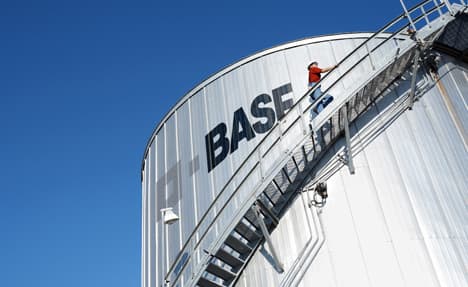Chemical giant BASF sees profits soar

BASF, the world's biggest chemicals company, presented stunning 2010 results on Thursday, bouncing back from a slump in 2009 and giving an upbeat outlook for the current year despite problems in Libya.
BASF said its 2010 net profit leapt more than three-fold to €4.56 billion ($6.27 billion), though the year-earlier figure of €1.41 billion was in large part a reflection of the global economic slowdown.
Despite problems in North Africa, chairman Jürgen Hambrecht said in a statement that the company is now "optimistic for the first quarter (of 2011) and the year as a whole."
He nonetheless acknowledged that "we are concerned about Libya," where BASF's Wintershall oil unit has halted production, leaving only a small group of core workers at its sites.
Meanwhile, the German group "achieved record sales and earnings in 2010," Hambrecht said, with the former climbing by 26 percent to €63.9 billion.
Earnings before interest and tax (Ebit) and special items leapt by 68 percent to €8.1 billion, the statement added, as BASF continued its integration of the specialty chemicals group Ciba.
It also finalized the purchase of Cognis, another small chemicals firm focused on health and nutrition products.
The fourth quarter of last year was especially strong for BASF, with net profit soaring to €1.1 billion from €455 million in the same period of 2009, outstripping an average analyst forecast of €891 million compiled by Dow Jones Newswires.
Rivals like Dow Chemical, DuPont and Air Liquide have also posted robust results and issued upbeat forecasts based on the assumption that global economic conditions will not deteriorate this year.
Like others, the German group is focused on Asia, and aims "to significantly exceed the record levels for sales in income from operations achieved in 2010," the statement said.
BASF plans to expand a site in Nanjing, China, and build a new specialty chemicals plant in Malaysia.
AFP/kdj
Comments
See Also
BASF said its 2010 net profit leapt more than three-fold to €4.56 billion ($6.27 billion), though the year-earlier figure of €1.41 billion was in large part a reflection of the global economic slowdown.
Despite problems in North Africa, chairman Jürgen Hambrecht said in a statement that the company is now "optimistic for the first quarter (of 2011) and the year as a whole."
He nonetheless acknowledged that "we are concerned about Libya," where BASF's Wintershall oil unit has halted production, leaving only a small group of core workers at its sites.
Meanwhile, the German group "achieved record sales and earnings in 2010," Hambrecht said, with the former climbing by 26 percent to €63.9 billion.
Earnings before interest and tax (Ebit) and special items leapt by 68 percent to €8.1 billion, the statement added, as BASF continued its integration of the specialty chemicals group Ciba.
It also finalized the purchase of Cognis, another small chemicals firm focused on health and nutrition products.
The fourth quarter of last year was especially strong for BASF, with net profit soaring to €1.1 billion from €455 million in the same period of 2009, outstripping an average analyst forecast of €891 million compiled by Dow Jones Newswires.
Rivals like Dow Chemical, DuPont and Air Liquide have also posted robust results and issued upbeat forecasts based on the assumption that global economic conditions will not deteriorate this year.
Like others, the German group is focused on Asia, and aims "to significantly exceed the record levels for sales in income from operations achieved in 2010," the statement said.
BASF plans to expand a site in Nanjing, China, and build a new specialty chemicals plant in Malaysia.
AFP/kdj
Join the conversation in our comments section below. Share your own views and experience and if you have a question or suggestion for our journalists then email us at [email protected].
Please keep comments civil, constructive and on topic – and make sure to read our terms of use before getting involved.
Please log in here to leave a comment.